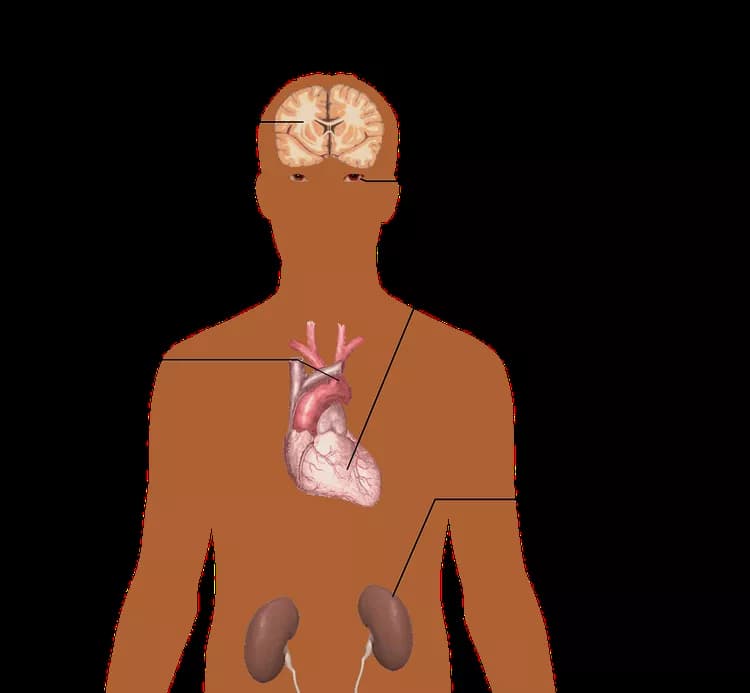Your blood pressure is the pressure exerted by circulating blood through the walls of the blood vessels. When your heart beats, it pushes blood through the arteries to the rest of the body. The force used to push the blood creates pressure in the arteries. This is called systolic blood pressure. Depending on the situation, activity, and disease state (if any), an individual’s blood pressure can vary. When the heart relaxes, the measurement is known as the diastolic blood pressure, which is indicated by the bottom number.
An average healthy person’s blood pressure is between 90/60 (read 90 over 60) and 139/80. Individuals who are closer to the 139/60 range are considered pre-hypertensive. A blood pressure that is pathologically low is called hypotension, whereas blood pressure that is pathologically high is called hypertension, or high blood pressure.
Hypertension occurs when blood is pushing too hard against the walls of the artery. Over time, this force can cause damage to the lining of the artery walls. When the artery linings are damaged, fat and calcium begin to build up on the wall, forming plaque. Plaque can cause problems in the body over time because it narrows, or even blocks, the pathway for blood to flow through the arteries. In addition, the arteries become stiff, causing atherosclerosis.
If the arteries to the heart are completely blocked, then the individual may have a heart attack, abnormal heartbeat, or coronary artery disease. Blocked arteries to the brain can lead to diseases such as strokes or transient ischemic attacks. Clogged arteries to other organs might lead to an increased risk for eye damage, kidney failure, and other illnesses.
Possible risk factors for high blood pressure include the following:
- A family history of high blood pressure
- Aging
- Heredity factors (including race)
- Gender (male)
- Smoking
- Drinking more than two alcoholic beverages a day for men; drinking more than one alcoholic drink a day for women
- Being overweight or obese
- High cholesterol
- Diabetes
- Lack of exercise or physical activity
- Low consumption of potassium, magnesium, and calcium
- Sleep apnea and sleep-disordered breathing
- Long-term use of pain medicines, like NSAIDs (although aspirin does not increase your risk of high blood pressure)
Individuals should start eating more vegetables that are high in potassium, magnesium, and calcium in order to maintain a normal blood pressure. Also, start aiming to walk at least 10,000 steps per day to get more physical activity. Any additional physical activity with proper and well-balanced nutrition can drastically improve your heart health and maintain a lower blood pressure range.
Additional Resources:
(2014, July 7). Retrieved December 3, 2014, from http://www.cdc.gov/bloodpressure/
He, F. J., Li, J., & Macgregor, G. A. (2013). Effect of longer term modest salt reduction on blood pressure: Cochrane systematic review and meta-analysis of randomised trials. BMJ, 346, f1325. doi: 10.1136/bmj.f1325
Arterial Hypertension (Management of). (n.d.). Retrieved December 3, 2014, from http://www.escardio.org/guidelines-surveys/esc-guidelines/Pages/arterial-hypertension.aspx
What Is High Blood Pressure? (n.d.). Retrieved December 3, 2014, from http://www.nhlbi.nih.gov/health/health-topics/topics/hbp
Helpful Peer-Reviewed Medical Articles:
Cheever, K. H. (2005). An overview of pulmonary arterial hypertension: risks, pathogenesis, clinical manifestations, and management. Journal of Cardiovascular Nursing, 20(2), 108-116.
Staessen, J. A., Gasowski, J., Wang, J. G., Thijs, L., Den Hond, E., Boissel, J. P., ... & Kerlikowske, K. (2000). Risks of untreated and treated isolated systolic hypertension in the elderly: meta-analysis of outcome trials.The Lancet, 355(9207), 865-872.
Morgado, M., Rolo, S., & Castelo-Branco, M. (2011). Pharmacist intervention program to enhance hypertension control: a randomised controlled trial.International journal of clinical pharmacy, 33(1), 132-140.
Vardulaki, K. A., Walker, N. M., Day, N. E., Duffy, S. W., Ashton, H. A., & Scott, R. A. P. (2000). Quantifying the risks of hypertension, age, sex and smoking in patients with abdominal aortic aneurysm. British journal of surgery, 87(2), 195-200.
Wang, T. J., Evans, J. C., Meigs, J. B., Rifai, N., Fox, C. S., D’Agostino, R. B., ... & Vasan, R. S. (2005). Low-grade albuminuria and the risks of hypertension and blood pressure progression. Circulation, 111(11), 1370-1376.
Related Articles
Test Your Knowledge
Asked by users
Related Centers
Related Specialties
Related Physicians
Related Procedures
Related Resources
Join DoveHubs
and connect with fellow professionals


0 Comments
Please log in to post a comment.